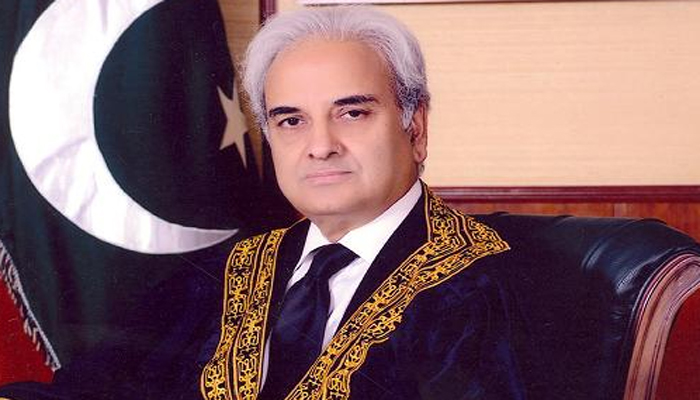Nasir–ul–Mul ناصر الملک
Justice Mulk presided and heard the Mukhtār Ma'i case—the controversial and highly publicized case regarded a gang rape that occurred in 2002. Mulk's judgement held Jirga, facilitated by four male, responsible for the rape while assisted the main accused but didn’t find sufficient evidence to stamp the charge of gang-rape on the accused. He reportedly penned his judgement that "Jirgas cannot be allowed to arbitrarily punish in the form of watta satta marriages and gang-rape to settle disputes without being answerable to the law.
On 2 November 2007, Barrister Aitzaz Ahsan submitted an application to the Supreme Court asking that the government be restrained from imposing martial law in Pakistan. Reviewing the application, a seven-panel bench in Supreme Court of Pakistan issued an injunction against the imposition of state emergency on 3 November 2007.
The bench penal was headed by Chief Justice Iftikhar Mohammad Chaudhry. Others included Senior Justices Nasir-ul-Mulk; Fayyaz Ahmad; Bhagwandas; Javaid Iqbal; Shakirullah Jan; Ghulam Rabbani. The injunction was overruled by President Pervez Musharraf and upheld the state emergency imposed on 2 November 2007 He refused to take an oath under PCO 2007 and was ultimately terminated from the Supreme Court. A strong, publicly instigated lawyer's movement which enjoyed support from PML(N) forced President Musharraf to resign in a threat to face impeachment. Mulk was reinstated at the Supreme Court when he took a fresh oath as a judge of the Supreme Court with his seniority intact.

Chief Justice of Pakistan (6 July 2014 – 16 August 2015)
Earlier, he was served as the acting Chief Election Commissioner of Pakistan, from 30 November 2013 to 6 July 2014. His oath was presided by President Mamnoon Hussain in a state ceremony held in President's office in Islamabad. The outgoing Chief Justice Tassaduq Hussain Jillani had laid down the judicial robes of his office on and handed over to Chief Justice Mulk.
He was appointed as Chief Justice on 6 July 2014.
Mulk is described by his fellow judges as "a very proactive judge and is very strict about the implementation of law in its letter and spirit. "Mulk is also known for his strictness towards implementation of law and his judgement reflected a textualist approach on human rights and non-discrimination issues. He retired as Chief Justice of Pakistan on 16 July 2015 and succeeded by Jawad S Khwaja.
if Pakistan's state institutions differ on implementation of the Constitution, the Supreme Court has the right to intervene, hinting at the same..”— Chief Justice Nasir-ul-Mulk, Cited source
Comments
Post a Comment